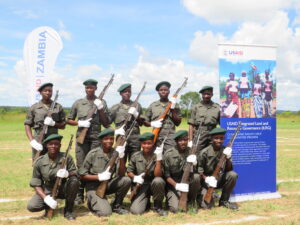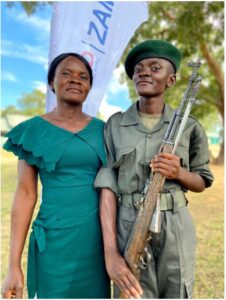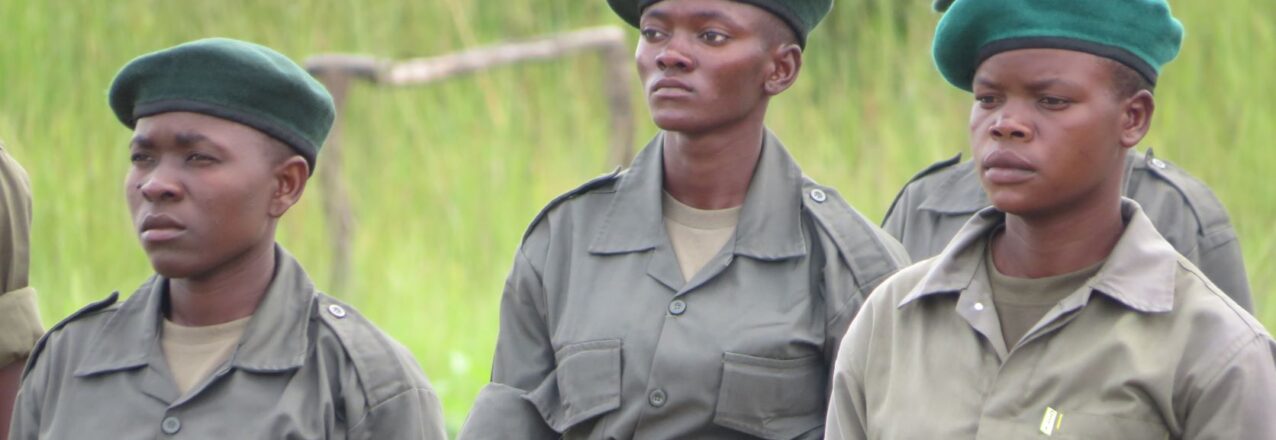Zambia’s protected area system is home to abundant wildlife, including species like elephant, giraffe, lion, leopard, and rhino. Zambia’s wildlife brings millions of dollars from the tourism sector each year into the country, some of which trickles down into the extremely poor rural communities adjacent to the protected areas. These investments can help to incentivize the protection of species and habitat that would otherwise be susceptible to poaching or conversion to agriculture. Wildlife law enforcement offers one of the few employment opportunities for young people in these rural communities and is an important benefit of conservation. For many young women, however, social and cultural norms make these employment opportunities largely out of reach. Wildlife law enforcement is a male-dominated field, and society perceives women as lacking the ability and skills to be employed in positions that require being away from home for extended periods of time. Few women are employed in the sector, even in entry level positions such as community scouts. Presently, women make up only 14 percent of community scouts employed nationally.
But perceptions are beginning to shift with Zambia’s first ever all-women team of community scouts, who are mostly under 25 years old. The USAID-funded Integrated Land and Resource Governance (ILRG) worked with the Department of National Parks and Wildlife (DNPW) and Conservation Lower Zambezi (CLZ) to recruit and train a cadre of female scouts working in the communities surrounding Lower Zambezi National Park, and encouraged other conservation partners to increase the number of women recruits they support. This initiative is demonstrating that women excel in wildlife protection when offered the chance. With formal employment comes increased status, independence, and confidence, as well as cultural acceptance for these women to decide if and when they would like to start a family. It shows that formal employment in the wildlife law enforcement sector can change the lives of young women for the better, and it impacts the perceptions of the broader communities on the value of conservation and the role of women in its protection. The women who have participated note the family and cultural pressure to get married and start families once they have finished with formal school. But with employment, the women are able to chart their own paths and take control of their futures.

Breaking these social barriers requires a range of support mechanisms and review of business as usual. To encourage women to apply, USAID partners disseminated messages about this career opportunity in secondary schools, clinics, churches, and by word of mouth. Recruitment is a competitive and physically demanding process. When the young women arrived at the co-ed training, many had never participated in endurance tests or even run in heavy boots. To address gender biases in the recruitment process, physical endurance standards were adapted for the women and men recruits.
Rosemary Chimeza, 21, was one of the 46 people recruited for the intensive three-month residential training at the Chunga Wildlife Training School in Kafue National Park.

Photo Credit: Francesca Cooke for USAID
Half of the cohort was female, which was the highest ever proportion of women recruited in a single selection. USAID ILRG supported the adaptation of the curriculum so that training was women-inclusive and gender-responsive. An eight-hour gender-specific session was held during training, covering both the challenges and benefits of women’s participation in natural resource management, and the prevention and response of gender-based violence (GBV). Women and men trainees also received training on socio-emotional skills like assertiveness, self-confidence, and leadership.
Training was physically and mentally demanding. It was the first time many young women were away from home. Building physical fitness and learning wildlife field operation also required perseverance and endurance. Rosemary and her colleagues recounted their experiences, “Every day there was a new physical activity for us to train in. We would be woken up unexpectedly in the middle of the night to start a long run through the rain. It was difficult but we supported each other. This made the training less stressful and actually it became a fun challenge. After the first few weeks, we knew that we could complete this course.”
Rosemary still remembers with joy the day she returned to her village following her graduation as a community scout. She says she was received “like a chief” by everyone. “People look at me differently, I look at myself differently,” she said. “The young men of the village show me respect, and others now fear me, because I’ve been trained in handling firearms. They call me ‘officer.’”
Breaking gender barriers
On patrol, the all-women team of community scouts are doing everything their male counterparts do. Young women still face challenges though, as deep-seated gender norms and traditional beliefs persist in the local communities. When they patrol remote areas, community scouts must spend extended periods of time away from their homes and families, which is often socially perceived as incompatible with women’s reproductive roles and with their disproportionate share of unpaid caring responsibilities.
On the other hand, the community scout job offers a well-respected employment pathway for young women and supports gradual shifts in gender norms. The women community scouts said that many of their female friends in their villages are already married, while the scouts feel they could wait more years to get married and spend their time investing in their careers and future. In many ways, the work of community scouts is redefining the role of young women in conservation and raising their value within the community.
“We had accepted that the scout job is too tough for women but these young women have shown us that it’s not,” explained Chimusambo, the village Head Person from Rosemary’s village.
As the only woman in her village with a job that is typically reserved for men, Rosemary feels like she is inspiring young women and men in her community. “They see my life as serious and focused, and they want to join and become community scouts. Even some parents now think they can send their girls to join,” said Rosemary.


